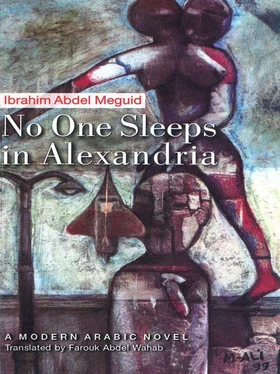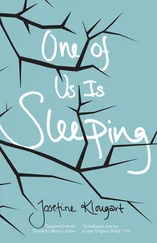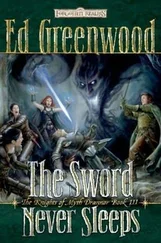Magd al-Din looked at the crowd of young men and women, taking in the refreshing smell of the sea and the grass, the sight of the vendors of peanuts, seeds, and roasted sweet potatoes. The horse-drawn carriages that had been going so fast were still speeding along, carrying lovers to the vendors of fried fish and shrimp, clams, and crabs. Magd al-Din decided that the whole scene did not suit him. How could he, a pious sheikh, be a witness to all these displays of love, coquetry, and mischief? So he asked Dimyan if they could go back as soon as possible, since the mid-afternoon prayer time was approaching, and in the winter, the time between that and the sunset prayer passed in the twinkling of an eye.
“We need a glass of tea in some café,” Dimyan said. “What do you think?” Magd al-Din thought sitting at a café was more proper than being in the midst of all the revelry.
Dimyan took him away from the coast, and away from Tatwig Street, busy with the streetcar, decorated stores, and children running in every direction.
He must have sensed what was bothering his friend. In no time at all, they found themselves in Manshiya, which opened up before them, dazzling light pouring through the spaces between its broad, low buildings with capacious balconies and wrought-iron railings. Most of the stores were closed because of the feast, but restaurants and bazaars were open for business, as were the money changers on the sidewalk, their glass counters filled with coins and banknotes from all over the world. Despite the feast, many of them were busy at work, always wearing their eyepieces. The statue of Muhammad Ali stood high in the middle of the square. Magd al-Din and Dimyan sat down at the Nile Café.
“This is the brokers’ café,” Dimyan told his friend. “The stock exchange is right in front of you.” He pointed to the middle of the square, where there stood a splendid white building with long, high windows and an imposing balcony. “And this,” he added, “is Tawfiq Street. The exchange is closed today. How many homes it has supported and how many it has ruined!”
Magd al-Din pondered briefly what Dimyan said, his eyes involuntarily scanning the patrons, staring at their prosperous faces and thick white or dark glasses with golden frames. Those who did not wear glasses seemed to be focusing on something not quite there. A strong smell of tobacco smoke filled the air. Magd al-Din lit a cigarette and rolled another for Dimyan. He saw Hamidu come into the café carrying his shoeshine box. He watched him stand there studying the patrons, tapping the box lightly, then quickly go over to an English officer in military uniform who had taken off his green woolen cap and placed it on the table. The officer, about thirty years old, had a strong, ruddy complexion.
Hamidu sat in front of the man and, placing the officer’s feet on his little stool, began to shine the black boots with white buckles. The officer was busy reading a foreign newspaper.
Magd al-Din did not take his eyes off Hamidu. As he watched him, he finished shining the boots, then started feeling them with his fingers. Magd al-Din did not know what exactly Hamidu was doing. Then Hamidu pulled the little stool from under the man’s feet and lowered them gently onto the floor and stood up. Magd al-Din saw clearly that the officer gave Hamidu a one-pound note. Hamidu took it, then reached out and took the officer’s baton, which the officer had placed on the table. The officer looked very puzzled, and before he could speak or protest, Hamidu had run away with the baton and the pound. The officer tried to overtake him; he got up, but as soon as he tried to move, he came crashing down, almost breaking his head and injuring his face. Luckily for him, there were several chairs in front of his, which helped break his fall, so he did not hit his face. He ended up on his back on the floor, writhing in pain and raising his head trying to see his feet. When Hamidu was feeling his boots, he had been tying the laces together — that was why he had lowered the officer’s feet gently to the floor. There was a commotion in the café. An English officer stood up and took his gun out of its holster. An Indian soldier stood, befuddled, watching Hamidu run away on Tawfiq Street. The café patrons laughed for a moment, then were silent again out of pity for the young officer lying on the floor in pain. The waiter then quickly went over to him, untied his shoelaces, and helped him up to his scat. All the patrons were now looking on in silence, awaiting his reaction. The officer, too, was silent, then in broken Arabic he swore, “Bastard!”
Everyone laughed, and he got up and left the café in embarrassment.

The last few days of the year passed quickly. Rain came down hard, almost flooding the city — which during the winter suffered torrential rain for days and days, then the rain would stop for several days, then it would rain again nonstop, and sometimes the rain changed to hail. Work opportunities were now scarce. The textile mill laid off Magd al-Din and Dimyan, and once again they had to go job hunting every day. The ships arriving in Mahmudiya Canal were few and far between. Sitt Maryam had told Zahra that during the last few weeks of the year, Alexandria suffered successive, almost continuous storms, until Epiphany, and then the storms would increase in frequency and fierceness in the following month, the last of the year. Camilla said, laughing, that the thunder was going to sound like bombs and would shake the houses, and lightning would dazzle the eyes. Zahra looked at her admiringly as she added that the best thing to see in Alexandria was the coastal road, the corniche, in the winter when the waves rushed in and crossed the street, crashing against the apartment buildings. She said the winter weather had prevented her from going to see Abd al-Wahhab’s new film, Long Live Love. The dark, cold, and rain made Amm Mahmud, vendor of the crime sheets, appear only rarely. News of crimes and scandals, however, still circulated among the people, who learned, for instance, about the young man killed by his colleague at night in the Labban neighborhood, and another young man whose body was found in a closed kiosk in the Farahda neighborhood. They found out about the second incident of a woman marrying a man while still married to another, and the man who had killed his own father a long time before, and on the day of whose execution the black flag flew above the Hadra prison.
On the clear days when he did not work, Magd al-Din was now spending most of his time at the café by the bridge. Dimyan, who kept him company most of the time, would ask him to read the paper out loud, even though he frequently expressed surprise that Magd al-Din kept buying the paper whenever he was not working. “How can you pay five pennies for useless words and lies?” he would ask. Magd al-Din had grown fond of knowing what was going on in the world. He only read the big headlines about the state of war in the world, then the crime section and the obituaries. Why? He did not know.
Hitler had liquidated his enemies in the German aristocracy and the remnants of the empire, as well as all who opposed him after the incident in Munich. The Italian legation celebrated the birthday of King Victor Emanuel III. The Egyptian government banned trade in cigarette butts, which was common among street children, who collected the butts in cafés and clubs, and on public transport vehicles and in the stations. They collected them as quickly as sparrows collected grain and then sold them to poor peoples’ smoke shops. The sly fox Mr. Churchill, first lord of the admiralty, gave a speech in which he talked of the Allies’ losses at sea over the ten weeks since the outbreak of the war and how England would not be intimidated by threats. The Wafd party leaders visited the tomb of Saad Zaghloul on National Struggle Day, which the government did not observe. Al-Ahli Cinema screened Ali al-Kassar’s film Lend Me Three Pounds. New camps were established to train the Territorial Army, which paraded before the minister of religious endowments at camps in Sidi Bishr and Damanhur. Despite the cold weather, the troops paraded in khaki shorts secured by wide suspenders and short-sleeved khaki pullovers over long-sleeved khaki shirts, with caps on their heads, and long Enfield rifles on their shoulders. The Monsignor nightclub opened the winter season by playing Argentinean music and Spanish songs. Forms were distributed to inhabitants of Karmuz, Mina al-Basal, and Gumruk to determine whether or not they wanted to be evacuated from Alexandria if the war reached it and where they would like to be evacuated to. No such forms were distributed in the poorer Ghayt al-Aynab neighborhood, which was part of Karmuz, even though it was separated from it by the Mahmudiya canal. The king inaugurated the new session of Parliament. A bullet discharged by a soldier’s gun killed an officer on guard duty in front of the governorate building. The officer’s funeral was marked by an official procession, then he was sent to his village of Quwaysna, where he received another official funeral procession. The soldier was executed. The lawyer in Alexandria had appealed the sentence, since the court had not given the soldier sufficient opportunity to defend himself, even though he had insisted that his rifle discharged accidentally. The black flag flew over Hadra prison for the second time in less than a month.
Читать дальше













